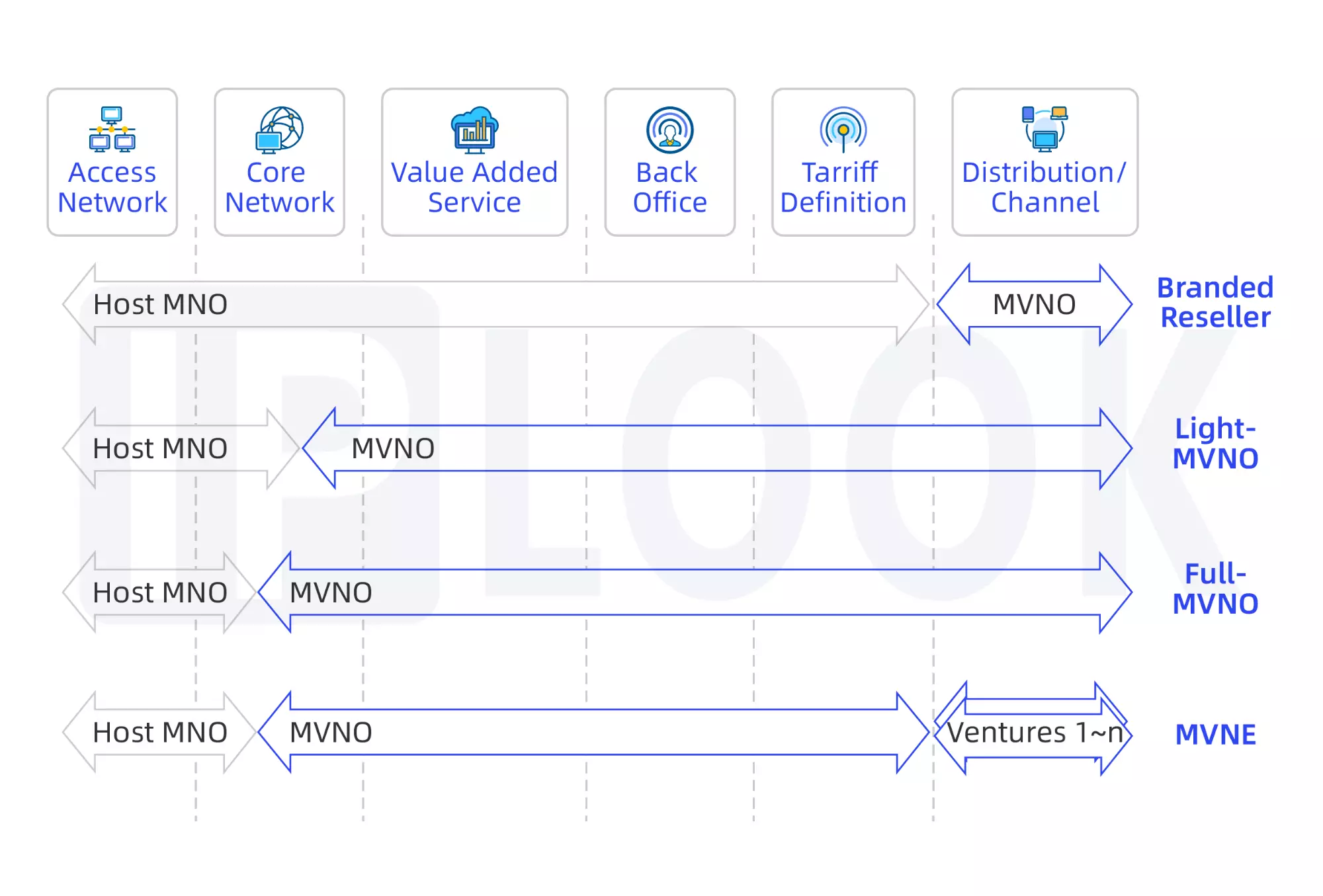
You can start a Light MVNO in 2025 by doing these steps. First, pick your target group. Next, choose your MVNO model. Then, find an MNO partner. Make sure you follow all laws. Build your backend systems. Set up support and ways to sell your service. Create your brand and set your prices. Make your service different from others.
The Light MVNO model costs less to start. You can launch your service faster. Running your business is easier. You can change prices as needed. You can focus on small groups of customers. You can build strong customer bonds with good support and cool branding. Focus on what makes your service special. Try to meet what your customers want.
Key Takeaways
- Find out who will use your service. Pick groups like gig workers or seniors. Make your service fit their needs.
- Pick the Light MVNO model. It costs less to start. You can launch your service faster. This model lets you work on branding and customer care.
- Work with a trusted mobile network operator (MNO). Use their network for your service. Make sure they have good coverage. Look for deals that are flexible.
- Follow the telecom laws. Keep customer data safe. Set up easy ways for customers to get help.
- Make strong backend systems for billing and support. Use Mobile Virtual Network Enablers (MVNE). They help with technical jobs.
Light MVNO Basics
What Is a Light MVNO
A Light MVNO is a mobile service provider. It works with a bigger network operator. You do not need to build your own network. You use the host operator’s network for technical things. You take care of customer service, billing, and selling SIM cards. You also do marketing and make new services for customers. Some people call Light MVNOs “enhanced service providers” or “thin MVNOs.” You can make your own plans and support systems. But you still need the main network for connection and technical help.
Tip: If you want to start a mobile business and save money, the Light MVNO model is a smart choice.
- Light MVNOs use the host network for core and radio access.
- You handle billing, customer care, and give out SIM cards.
- You focus on services for customers and marketing.
- The host operator takes care of the network.
Why Choose Light MVNO
You might ask why people pick the Light MVNO model in 2025. The answer is easy. You need less money to get started. You do not have to build or run a network. You can start your service faster. You can spend more time on your brand and helping customers.
Here is a table that shows how a full MVNO and a Light MVNO are different:
| Aspect | Full MVNO | Light MVNO |
|---|---|---|
| Infrastructure | Builds and runs its own core network | Uses host operator’s network for all technical needs |
| Regulatory Requirements | Handles interconnections and call termination income | Focuses on customer relations and billing |
| Operational Focus | Manages its own SIM cards and customer base | Interfaces with host operator’s systems |
A Light MVNO lets you skip hard network jobs. You can focus on your customers and your brand. You can also start your business quickly. This model is good if you want to reach special groups or offer new services.
- You let the host operator manage the network.
- You spend less money and time to set up.
- You can focus on marketing and customer care.
- You can launch your service faster.
Start a Light MVNO

Define Target Segment
You need to know who will use your service. Look at what is popular in the mobile market. Many people want cheap and flexible plans. Some groups, like gig workers, seniors, and students, have special needs. Businesses want fast and steady connections. Devices like smart meters and eSIM gadgets need reliable service.
Here is a table to help you pick a target segment:
| Target Segment | Key Considerations |
|---|---|
| Price-sensitive retail users | Focus on competitive pricing and value offerings. |
| Gig economy professionals | Offer flexible data plans that cater to their dynamic needs. |
| Low-power smart meters | Implement narrowband IoT solutions for efficient connectivity. |
| Senior users | Simplify service flows to enhance user experience. |
| Globally roaming devices with eSIM | Ensure seamless international connectivity and service. |
Tip: Pick a group with a clear need. This helps you stand out and build loyalty.
Unique Value Proposition
You must give customers a reason to pick your Light MVNO. Think about what makes your service different. You can focus on lifestyle needs, like easy plans for seniors or flexible data for gig workers. Use data to learn what customers want and how much they will pay.
| Strategy | Description |
|---|---|
| Focus on Customer Lifestyle | Tailor services to customer needs and pain points. This builds loyalty and helps you stand out. |
| Data Analysis | Use data on plan usage and price sensitivity to create strong offers. |
Some ways to make your offer special: Create plans just for your group. Give great customer service. Bundle things like data and entertainment.
Note: A strong value proposition helps you win and keep customers.
Choose MVNO Model
You need to pick the right MVNO model for your business. Each model gives you different control and costs.
| MVNO Type | Key Features |
|---|---|
| Branded Reseller | You focus on branding and marketing. The host handles most operations. |
| Light MVNO | You manage your own billing and support. You do not own the network. |
| Thick MVNO | You run some network parts. This gives you more features but costs more. |
| Full MVNO | You own key network parts. This gives you the most control but needs big investment. |
Think about your money and goals. The Light MVNO model gives you more freedom and lower costs. It works well if you want to focus on customer service and branding.
Select MNO Partner
You must work with a mobile network operator (MNO). This partner lets you use their network. Look for an MNO with good coverage and fair prices. Some MNOs offer flexible deals for Light MVNOs.
You can also work with technology partners for extra features, or with content creators for special media. Retail partners help you sell SIM cards in more places.
| Partnership Type | Description |
|---|---|
| Network Operators | Work with established networks for coverage. |
| Technology Providers | Add features like analytics or AI. |
| Content Providers | Offer exclusive content to your users. |
| Retail and Distribution | Sell SIM cards in stores and online. |
Tip: Choose partners who help you reach your target customers.
Legal Compliance
You must follow all telecom laws. Talk to regulators early. Learn about approval steps and timelines. Make sure you protect customer data and respect privacy laws. Set up clear customer support to meet legal rules.
| Compliance Pitfall | Solution |
|---|---|
| Engaging with regulators | Talk to regulators early to understand the process. |
| Understanding consumer protection laws | Learn the laws to protect your customers and avoid problems. |
| Ensuring data privacy | Use strong privacy tools to keep user data safe. |
| Customer service neglect | Build easy-to-use support to keep customers happy and legal. |
Note: Missing a legal step can delay your launch or cause fines.
Backend Systems
You need strong backend systems to run your Light MVNO. These systems handle billing, customer care, and business tasks. You can use a Mobile Virtual Network Enabler (MVNE) to manage technical parts. This lets you focus on branding and customer service.
| Backend System | Role |
|---|---|
| Billing | Makes sure you charge customers correctly and on time. |
| Business Support Systems (BSS) | Keeps your business running smoothly. |
| Mobile Virtual Network Enablers (MVNE) | Handles technical work so you can focus on your brand. |
Tip: Pick systems that are easy to connect with your MNO partner. This saves time and avoids mistakes.
Support and Distribution
You must help your customers and make it easy for them to join. Set up support channels like phone, chat, and email. Use automation to answer common questions fast. Make your SIM activation process simple. Sell your service online and in stores.
| Strategy | Description |
|---|---|
| Targeted Propositions | Offer plans that fit your chosen group. |
| Automation in Operations | Use tools to manage users and reduce manual work. |
| Simplified Activation Process | Make it easy for customers to start using your service. |
- Give clear instructions for new users.
- Use retail partners to reach more people.
- Keep your support team trained and friendly.
Brand and Pricing
Your brand should match your target group’s needs. Build a strong identity that stands out. Use special channels to promote your service. Watch your costs so you can offer good prices.
| Strategy | Description |
|---|---|
| Differentiate Through Brand Positioning | Build a brand that fits your audience’s lifestyle. |
| Leverage Existing Distribution Channels | Use stores and online channels for promotions and rewards. |
| Optimize Costs and Margin | Keep marketing and operations lean to offer better prices. |
| Remain Agile | Change your offers as the market changes. |
For pricing, follow these steps: Match your plans to what customers want and can pay. Bundle services to add value. Use flexible and tiered pricing for different budgets. Check what other companies charge. Use data to adjust prices quickly.
Tip: Good pricing and a strong brand help you attract and keep customers.
Avoid Pitfalls
Compliance Issues
You need to follow all rules when running a Light MVNO. Many new MVNOs have trouble with privacy laws and fines. If you ignore these rules, you could lose your license or pay big fines.
| Compliance Issue | Recommended Solution |
|---|---|
| Data privacy laws (GDPR, CPRA, PDPA) | Make sure your systems protect customer data well. |
| Non-compliance penalties | Work with regulators to avoid paying large fines. |
| Increased compliance costs | Try new business ideas that focus on privacy. |
New telecom rules can change your business. For example, new EU rules help small MVNOs compete. In Asia Pacific, new laws make it easier to start but add more rules. North America and the EU now have stricter privacy laws. These laws can make your costs go up.
Tip: Talk to regulators early. Build strong privacy systems from the beginning.
Technical Challenges
Technical problems can slow your launch or hurt your service. You depend on your host network for coverage and quality. This means you cannot control everything about your service. Old business systems can make it hard to change plans or add features. You need to keep up with new technology to stay ahead.
| Challenge | Description |
|---|---|
| Dependency on host networks | You have less control over coverage and service quality. |
| Complexity in traditional BSS | Old systems make it hard to change and grow fast. |
| Need for rapid innovation | You must invest in new tech to stay competitive. |
To fix these problems, make billing and customer systems simple. Use new tools like eSIM, IoT, and 5G to make your service better. Make sure your systems can grow with your business.
Partner Negotiation
Getting a good deal with your MNO partner is important. You should know what you need and what you can offer. Build trust and be honest about your goals. Look for deals that help both sides win.
- Know what your business needs.
- Build trust with your partner.
- Be honest about your goals.
- Try to find deals that help everyone.
- Watch out for common mistakes when talking.
Note: Good talks with partners help you get better prices and succeed for a long time.
Marketing Mistakes
Many new MVNOs make mistakes in marketing. Some do not know their target group well. Others copy big brands instead of making their own style. If you do not explain your value, customers may not pick you.
- Learn about your target group before you start.
- Make a brand that fits your audience.
- Use clear and simple messages.
- Check your results and change your plans if needed.
Stay focused on what makes your service special. This helps you stand out and grow your business.
You can start your own Light MVNO by following clear steps.
- Choose your target group.
- Build your brand and set your prices.
- Work with a strong network partner.
- Make sure you follow all rules.
- Use good systems for billing and support.
Careful planning helps you avoid mistakes. Strong compliance keeps your business safe. Unique ideas help you stand out. You should talk to experts and read more before you launch.
FAQ
What is the main cost when starting a Light MVNO?
You will spend most of your money on backend systems, SIM cards, and marketing. You do not need to build a network. This saves you a lot of money compared to a full MVNO.
How long does it take to launch a Light MVNO?
You can launch in as little as three to six months. The timeline depends on how fast you set up systems, sign with an MNO, and get legal approval.
Do I need technical skills to run a Light MVNO?
You do not need deep technical skills. You can use MVNE partners for technical tasks. Focus on customer service, branding, and business growth.
Can I offer eSIM services as a Light MVNO?
Yes, you can offer eSIM services. Many MNOs and MVNEs support eSIM. This helps you reach more customers, including those with new devices.


